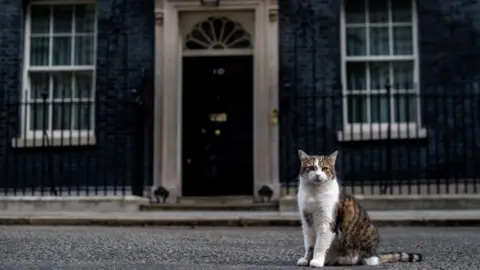The recent deliberations regarding pest control at the UK Parliament have resulted in a surprising turn of events: cats will not be utilized as pest controllers. This decision follows a proposal made by Labour peer Lord Berkeley, who suggested the introduction of felines to mitigate the ongoing issue of vermin in the Palace of Westminster. While many may find this idea charming, particularly with respect to the much-loved resident cat of Downing Street, Larry, authorities have firmly ruled out the feasibility of such an initiative.
Larry, notably, has served as the chief mouser at 10 Downing Street since 2011, charming politicians and officials alike while performing his duties. However, despite Larry’s success and popularity, efforts to expand the solution to include cats in the halls of Parliament have been met with rejection. Senior Deputy Speaker Lord Gardiner of Kimble conveyed the parliamentary authorities’ stance, highlighting the various challenges that such an approach would entail.
In addressing Lord Berkeley’s inquiry, Lord Gardiner cited numerous risks that would arise from introducing cats to the parliamentary estate. He explained that the ongoing construction work within the premises creates a hazardous environment for free-roaming cats. Additionally, there are concerns about self-closing doors that could potentially trap a cat without access to food and water for extended periods. Furthermore, the lack of consistent arrangements for their care would place the animals in a precarious situation—factors that ultimately influenced the decision against employing felines for pest control.
The Palace of Westminster, a Grade I listed building, has grappled with pest issues for years, leading to significant expenditures on pest control services. In light of this, the authorities have opted to continue their partnership with a dedicated pest control contractor to implement well-planned and efficient measures to address the infestation concerns. This indicates a commitment to professional pest management rather than relying on animal intervention, which may seem whimsical but is fraught with practical shortcomings.
Lord Gardiner’s written response detailed the reasoning behind the decision, assuring that the current pest control strategies are being executed with a focus on targeting vermin efficiently and effectively. The concern for animal welfare, alongside the practical difficulties of maintaining cat care amidst a bustling political environment, underscored the authorities’ careful consideration of the proposal.
It is worth noting that Larry’s position at 10 Downing Street is emblematic of the unique roles that cats have carved out within governmental traditions. After all, Larry was adopted from Battersea Cats and Dogs Home and has been a beloved presence in the residence of the Prime Minister, weathering changes in leadership and even welcoming new feline companions along the way. His tenure symbolizes the often light-hearted yet significant relationships that many people hold with their pets, even in serious settings.
In contrast, the Foreign Office once adopted a cat named Palmerston in 2016 to serve as a chief mouser. Palmerston enjoyed his time before retiring to the countryside in 2020, but he has since made headlines again by accepting an overseas diplomatic role as a “feline relations consultant” in Bermuda. Such charming tales keep the discussion of pets in politics alive even amidst practical decision-making regarding pest control.
Conclusively, this discourse on cats and their proposed utility in pest control at the UK Parliament, though playful, reveals the genuine challenges inherent in animal management in a politically significant environment. Engaging in whimsical discussions about leveraging animals in pest control brings levity but ultimately must defer to stringent safety and welfare considerations as prioritized by the authorities tasked with maintaining order within the iconic establishment.



